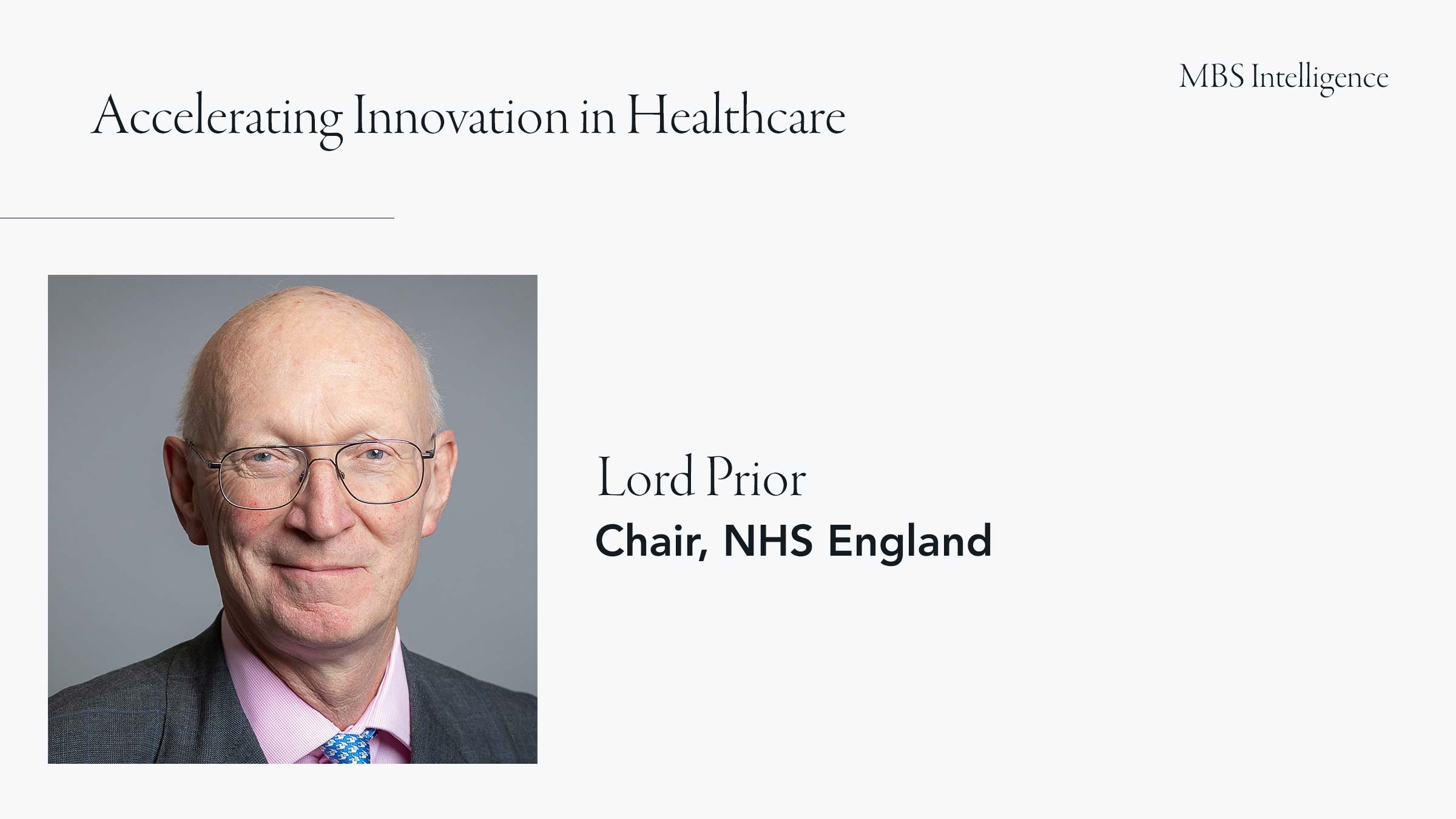There is nothing quite like the bubble of conversation and connection between people meeting and re-meeting over a shared meal. We have missed it hugely over the last two years: Zoom has enabled the transactions of our lives to continue, but the warmth and possibility of real social interactions are something else.
Last Wednesday evening, it was a joy to be re-immersed in the thrill of real conversation and debate at my first event as Director of the Healthcare Practice at MBS – an intimate dinner, hosted by us, dedicated to discussing innovation in healthcare, chaired by Lord Prior, Chair of NHS England.
It was a privilege to welcome Lord Prior, with a diverse group of distinguished healthcare leaders, to the beautiful Emin Room at 34 Mayfair. Our group included CEOs of leading NHS hospitals and some of the private sector’s largest providers, members of the private equity and venture capital communities, founders from our sector’s most disruptive health-tech startups, and clinical leaders and advisors – all committed to understanding how innovation and investment can drive improvements in healthcare.

There is a conundrum at the heart of healthcare. By nature, the sector is innovative, motivated by a sense of possibility and a desire to tackle some of our most entrenched, troubling problems. But healthcare’s equally strong inherent safety-consciousness – on which patients’ lives depend – has historically acted as a brake, forcing a steady, deliberate and often risk-averse approach to progress.
In the past two years, however, the need to respond to Covid-19 has fast-tracked innovation, most obviously around vaccine and treatment development, but also in accelerating the digital transformation the sector needs.
“In the past two years, however, the need to respond to Covid-19 has fast-tracked innovation, most obviously around vaccine and treatment development, but also in accelerating the digital transformation the sector needs.”
Today, there is the promise of greater customer-centricity, as digital services become more embedded. And investment is growing. Beyond drug and treatment development, digital health, healthtech, women’s health, mental and emotional health, and biotech are all vibrant areas seeing lively flows of investment, as well as technology that builds operational capacity in healthcare services.
It was stirring to hear first-hand how this sea-change is playing out across both the public and private sectors. Our lively discussion was held under Chatham House rules, but below I have outlined the themes that resonated most strongly throughout the evening:
Covid accelerated important change… what now?
The traumas and tragedies of Covid-19 and the pandemic response have transformed healthcare over the past two years, and will continue to transform the sector in the years ahead. Reflecting on this period, our dozen leaders recognised the power of the clarity of purpose and vision which took hold during Covid-19, especially during the first lockdown and subsequent surges. In both private and public settings, teams were united in a singular goal, enabling focused creativity, innovation, and speed. Amazing outcomes followed – clinical practice changed, online consultations became possible, new treatments were trialled, proved and adopted.
Bottling that clarity of focus while re-adjusting to face more multi-faceted problems in the recovery phase is the contemporary challenge. We now know that groundbreaking achievements come from that focus, and from collaboration, digitisation, pace, and managed risk-taking. There is a challenge for boards here, too, in recognising the innovation and impact that flowed from a lightening of the governance regime in the immediate aftermath of Covid-19.
Collaboration between the public and private spheres makes extraordinary things happen
While there is some ongoing suspicion of the private sector’s motives in parts of the NHS, it was great to hear first-hand from leaders in the public and private sector about the levels of collaboration taking place today and what can be achieved when institutions work together towards a common goal. With the UK now established as the best place in the world to do clinical trials, and the patient benefit of reductions in costs of human genome sequencing, the possibilities created when the NHS and private providers work in partnership are clear.
Looking ahead, there may be potential for further collaboration to reduce waiting times and to support patients where the NHS is under most pressure. In particular, there was a sense that much of the exciting innovation taking place in private businesses isn’t translated into something that can be felt on the front line. Ensuring progress does trickle down is one aspect of innovation we need to be determined to address. One guest, whose roles straddle the public and private sectors, spoke about how he “innovates from Monday to Thursday” but sees none of that progress in his clinic on Friday.
Consumer behaviour can drive change – how do we enable that?
Around our table were leaders from two of our sector’s most exciting healthcare startups. The emergence and rapid growth of consumer-focused healthtech and caretech is part of a broader trend that is seeing organisations transform their propositions to cater for a shift in consumer and patient expectations. Often in response to outdated systems, growing waiting lists, or new demand, today’s patients are looking for digitisation, personalisation, and convenience, and for products and services to interact with us more intimately as individuals. Expectations are certainly changing. As pointed out by an investor, it might be time for the healthcare sector to look to consumers – rather than the government or regulatory bodies – to kickstart much-needed transformation.

People who work in healthcare are motivated by a desire to help people
Whilst our robust debate recognised the importance of funding in the system, particularly in stimulating changes to clinical roles and practice, there were several moments of reflection on the commitment and energy of the clinical workforce. Several leaders around the table were also clinicians who continued to practise alongside their leadership roles, often at wholly inconvenient times (including, weekly, on a Saturday morning). The power of this motivation and intention needs to underpin our understanding of leadership and workforce, and shape how we conceive of what might be possible in the future.
We must not forget the power of positive leadership
The final theme I’d like to pull out from our dinner is the importance of leadership. Sitting at the helm of a healthcare organisation has its (very significant) challenges, not least the intensity of the operating pressure and the slow pace at which innovation has traditionally been adopted. But fundamentally, we have all seen organisations whose trajectories have changed by bringing in good leaders. A motivated leader with vision – that is to say, every guest sitting around the table on Wednesday night – has the potential to change the culture of an organisation, the way it operates and the way it collaborates. “Healthcare”, as one of our guests put it, “is a communication sector”. As the possibilities of innovation, the growing appetite for investment in healthcare, and the desire to rebuild a vibrant sector in response to the last two years all come into sharper relief, to forget the power of positive, inspiring leadership would be detrimental to the future of our sector.
I came away from last week’s dinner feeling invigorated and excited for the future. Buoyed by increasing investment, the healthcare sector is evolving to become more creative, innovative and patient-centric than it has ever been before. I’d like to once again thank Lord David Prior for chairing this fascinating discussion, and everybody who joined us for sharing their insight.








